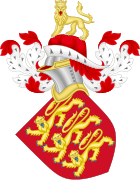| Act of Parliament | |
 | |
| Long title | None |
|---|---|
| Citation | 3 Edw. 1. cc 1–51 |
| Territorial extent | England, later extended to Wales, Scotland, Ireland and British colonies |
| Dates | |
| Made | April or May 1275[a] |
| Royal assent | April or May 1275 |
| Other legislation | |
| Amended by | |
Status: Partially repealed | |
| Text of the Statute of Westminster, The First (1275) as in force today (including any amendments) within the United Kingdom, from legislation.gov.uk. | |
The Statute of Westminster of 1275 (3 Edw. 1), also known as the Statute of Westminster I, codified the existing law in England, into 51 chapters. Chapter 5 (which mandates free elections) is still in force in the United Kingdom[1] and the Australian state of Victoria[2] whilst part of Chapter 1 remains in force in New Zealand.[3] It was repealed in Ireland in 1983.
William Stubbs gives a summary of the Statute:[4]
This act is almost a code by itself; it contains fifty-one clauses, and covers the whole ground of legislation. Its language now recalls that of Canute or Alfred, now anticipates that of our own day; on the one hand common right is to be done to all, as well poor as rich, without respect of persons; on the other, elections are to be free, and no man is by force, malice or menace, to disturb them. The spirit of the Great Charter is not less discernible: excessive amercements, abuses of wardship, irregular demands for feudal aids, are forbidden in the same words or by amending enactments. The inquest system of Henry II of England, the law of wreck, and the institution of coroners, measures of Richard and his ministers, come under review as well as the Provisions of Oxford and the Statute of Marlborough.
Though it is a matter of dispute when peine forte et dure (Law French for "hard and forceful punishment") was first introduced, chapter 3 states that those felons standing mute shall be put in prison forte et dure.[5]
Cite error: There are <ref group=lower-alpha> tags or {{efn}} templates on this page, but the references will not show without a {{reflist|group=lower-alpha}} template or {{notelist}} template (see the help page).
- ^ Statute of Westminster, The First (1275). Acts of the English Parliament. Vol. 1275 c. 5. Retrieved 29 March 2015.
- ^ Imperial Acts Application Act 1980 (Vic) s 8 "And because elections ought to be free, the King commandeth upon great forfeiture, that no man by force of arms, nor by malice, or menacing, shall disturb any to make free election."
- ^ Specifically, "so much of that Act as is stated in the words 'The King willeth and commandeth ... that common right be done to all, as well poor as rich, without respect of persons.'" Imperial Laws Application Act 1988 (Public Act 1988 No 112). New Zealand. 28 July 1988. sched 1.
- ^ Stubbs, William (1875). The Constitutional History of England in Its Origin and Development. The Clarendon press.
- ^ Ripley, George; Dana, Charles A, eds. (1867). New American Cyclopedia. Vol. 13. D. Appleton & Company. p. 84.